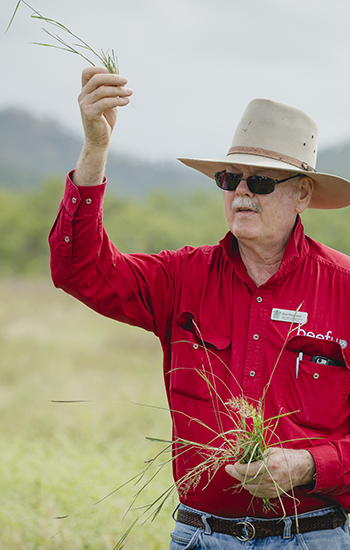The focus is on
all-important
ground cover
Ground cover is important because it can reduce runoff and erosion. Sediment loads can be reduced by maintaining ground cover and pasture biomass to improve rainfall infiltration.

DAF Principal Extension Officer Bob Shepherd talks about pasture and end-of-season ground cover.
Ground cover assists in improving the productivity and the health of the general landscape by:
- reducing damage to the soil surface caused by rainfall impact;
- slowing water flow across the soil surface, reducing erosion, runoff of nutrients and sediment movement;
- improving the infiltration of water into the soil;
- improving the water retention of the soil system; and
- minimising spaces for germination of broadleaf weeds.
LDC is helping landholders implement benchmarked grazing practices for improved water quality. These include (but are not limited to):
- individual (one-on-one property visits), peer-to-peer, and cluster group visits offering extension support and tailored technical advice;
- a wide range of training, educational and knowledge sharing events to promote practices designed to manage ground cover including, stocking strategies, wet season spelling, pasture resting, mechanical intervention or property development with strategic fencing and water points;
- grants for projects to help accelerate practice change to improve water quality such as additional fencing and watering points for improved water distribution and to spread grazing pressure; and
- constructing diversion and sediment banks to retain water in the landscape.
Since 2017, more than 91 per cent of large grazing properties in the BBB have undertaken projects to improve land condition.
The majority of these implement on-ground water quality practice change, and report to the Paddock to Reef Integrated Monitoring, Modelling and Reporting program.
LDC also tailors events and activities to cater for property needs. These include (but are not limited to):
- forage budgeting;
- land condition assessment training;
- soil testing;
- weed management washdown training;
- biosecurity events;
- grazing workshops;
- grass ID workshops;
- herd management workshops;
- property mapping and planning;
- biodiversity assessments; and
- water quality sampling.
Grazier support
Stewardship
What’s next?
